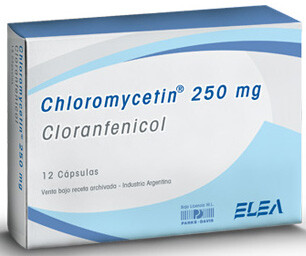Chloromycetin (Chloramphenicol)

Dosages
Chloromycetin 500 mg
| Quantity | Price per pill | Total price | |
|---|---|---|---|
| 60 | $0.87 | $52.00 | |
| 90 | $0.79 | $71.00 | |
| 120 | $0.76 | $91.00 | |
| 270 | $0.69 | $185.00 | |
| 360 | $0.67 | $242.00 |
Payment & Shipping
Your order is securely packed and usually ships within 24 hours. Below is what a standard package looks like.
It is about the size of a regular letter (9.4x4.3x0.3 inches) and shows no details about what is inside.



| Shipping Method | Estimated delivery |
|---|---|
| Express Free for orders over $300.00 | Estimated delivery to the U.S.: 4-7 days |
| Standard Free for orders over $200.00 | Estimated delivery to the U.S.: 14-21 days |









Discount Coupons
- Independence Day - July 4, 2026 10% JULY410
- Labor Day - September 7, 2026 7% LABOR07
- Thanksgiving - November 26, 2026 9% THANKS09
Brand Names
| Country | Brand Names |
|---|---|
 Argentina Argentina | A-Solmicina-C Anuar Bio-Gelin Bioticaps Farmicetina Isopto Fenicol Klonalfenicol Pluscloran Poenfenicol Quemicetina Quotal NF |
 Australia Australia | Chloroptic Chlorsig |
 Belgium Belgium | Fenicol Isopto Fenicol Kemicetina |
 Brazil Brazil | Amplobiotic Arifenicol Auridonal Clorafenil Cloranfenil Clorfenil Farmicetina Feniclor Fenicloran Neo Fenicol Profenicol Quemicetina Sintomicetina Uni Fenicol Visalmin Vixmicina |
 Canada Canada | Ak-Chlor Chloroptic Diochloram Fenicol Novo-Chlorocap Ophtho-Chloram Pentamycetin Sopamycetin Spersanicol |
 Finland Finland | Oftan Akvakol Oftan Chlora |
 France France | Cebenicol Ophtaphenicol Tifomycine |
 Germany Germany | Aquamycetin-N Berlicetin Chloramsaar N Chloroptic Dispaphenicol Leukomycin Oleomycetin Paraxin Posifenicol C Thilocanfol C |
 Greece Greece | Chloranic Chlorocollyre Chloromyk Chloroptic Kemicetine Kemipen Kramerin Maltogen Niamycetine Ursa-Fenol |
 Hungary Hungary | Chlorocid |
 Italy Italy | Chemicetina Cloramfen Micoclorina Micodry Mycetin Optafen Sificetina Vitamfenicolo |
 Malaysia Malaysia | Beaphenicol Chloramex Nicol Spersanicol Xepanicol |
 Mexico Mexico | Abefen Alcan Bariclor Brocil Cetina Clomicin Clorafen Cloramed Cloramfeni Cloramfenil Clorampler Cloran Cloranmicron Cloratenol Clorazin Clordil Clorfenil Clorofunon Clorotan Diarman Dilclor Domicetina Enteromicin Estreptopal Exacol Fenicol Fenisol Fenizzard Furocloran Italmicin K-Biofen Lebrocetin Leclor A Naxo Oftadil Omycet Palcol Palmiclor Palmifer Palmisol Procloril Pronicol Quemicetina Solufen Solvaris Spersanicol Uniclor Vixin Wilyfenicol |
 Netherlands Netherlands | Globenicol |
 New Zealand New Zealand | Chloroptic Chlorsig Isopto Fenicol |
 Poland Poland | Detreomycyna |
 Portugal Portugal | Clorocil Dermimade Cloranfenicol Fenoptic Micetinoftalmina |
 Spain Spain | Chemicetina Cloramplast Cloranfe Cloranfenic Cloranfenico Cloranf Succi Clorofenicina Hortfenicol Isopto Fenicol Normofenicol Pantofenicol Plastodermo Tramina |
 Sweden Sweden | Isopto Fenicol |
 Turkey Turkey | Armisetin Kemicetine Klorasuksinat |
 United States United States | Ak-Chlor Chloroptic |
| Manufacturer | Brand Names |
|---|---|
| Abbott Laboratories | Paraxin |
FAQ
Description
Chloromycetin is a drug in the broad-spectrum antibiotic family. It reduces numerous bacterial infections, including those of the blood, brain, lung, and other major organs. However, it is ineffective for viral illnesses, colds, or the flu.
Even if you see improvements in your health, never stop taking Chloromycetin earlier than suggested by your doctor. If you stop taking the drug too soon, it could make things worse. Until you know how this drug affects you, take caution when operating machinery, driving, climbing, or performing other risky actions. Avoid consuming alcohol. Before giving this medicine to a child, always contact a doctor.
Consult a physician if any of the following apply to you or have previously affected you: cardiac conditions (such as irregular heart rhythms), kidney or liver disease, anemia or other blood conditions, allergy to chloramphenicol or related drugs, foods, coloring materials, or preservatives, digestive or intestine issues, particularly colitis, dental issues, pregnancy, nursing, or intending to get pregnant.

Chloromycetin is available as a liquid solution and capsule for oral use.
This drug is often taken in 50 milligrams (mg). It is advised to take medication four times a day, on schedule.
Some fluids should accompany this medication. When using Chloromycetin, it is best to drink multiple glasses of water daily to protect your kidneys. You can take it on an empty stomach or with food. Taking the medication with food lessens gastrointestinal discomfort and facilitates your body's absorption of the medication.
It is recommended to swallow the capsules whole. Never open, chew, break, or crush them.
For the medicine to be evenly mixed, give the beverage a good shake before using it. Use a measuring spoon or medicine cup with a designated marking to ensure you are taking the right amount.
As directed by your doctor and on the label of your prescription, take this medication as directed.
Try to take the dose as soon as you remember if you miss it. Take just one dose if it's time for your next one. The dosage doesn't need to be doubled.
Any medication used in excess might have detrimental effects on your health. Consult your healthcare physician right away if you believe you have overdosed.
Chloromycetin may interact with the following:
- Chlorpropadan
- B vitamins and phenytoin
- Iron
- Antibiotics Paricalcitol
- Didaxercalciferol Rifampin
- Warfarin Entacapone
- Birth control pills or oral contraceptives
- Tolbutamide, Ramelteon, and Phenobarbital
This is not an exhaustive list of interactions.
Talk to a doctor about using your medication with food, drink, or tobacco with your healthcare provider.
You should be aware of the following side effects: allergy reaction (edema of the face, lips, throat, or tongue; hives, itching, skin rash, or swelling); breathing difficulties, chest pain, and dyspnea chills, fever, and sore throat; vomiting and nausea; muscle stiffness, spasms, tingling in your hands or feet (tremor), or numbness; dark urine, loose or difficult-to-urinate stools, diarrhea, or both headache, lightheadedness, ear ringing, or hearing loss; bloating, gas in the stomach, cramping, indigestion, or disturbed stomach; pale skin, redness, blistering, peeling, or loosening of the skin, especially inside the mouth; palpitations: a rapid, hammering, or irregular heartbeat; weakness and exhaustion issues with the liver, eyes, and skin; unusual bruises or bleeding; gray syndrome: blue-gray complexion, bloated stomach, low body temperature, irregular breathing.
Notify your healthcare provider right away if these continue or get worse. Other adverse effects might also arise; this is not an exhaustive list. Speak with your pharmacist or doctor if you have any other side effects not listed above.
Tightly seal and store at room temperature, below 30 degrees Celsius (86 degrees Fahrenheit), away from moisture, direct heat, and sunlight. Store away from sinks and bathrooms. Medication should be kept out of children's reach and away from pets.
If you would like additional information on this medication, contact your doctor.
FAQ
How Does Chloromycetin Work?
Chloromycetin functions by inhibiting bacterial growth. It accomplishes this by obstructing their capacity to make the proteins required for survival.
Is it possible to treat viral infections with Chloromycetin?
No, Chloromycetin is an antibiotic that works only on infections caused by bacteria. It is ineffective against viral infections such as the flu or common cold.
Is it okay to take Chloromycetin when expecting a baby?
Chloromycetin should only be taken by a pregnant woman under a doctor's supervision and only when absolutely necessary. Consult your doctor before breastfeeding while taking Chloromycetin because it may enter breast milk.
Is it possible to treat eye infections with Chloromycetin?
Yes, Chloromycetin, sold as an eye cream or drops, can treat conjunctivitis and other bacterial eye infections.
Is Chloromycetin suitable for kids to use?
Children may take Chloromycetin for specific bacterial illnesses. However, the dosage will be adjusted based on the child's weight and age.
Can allergic responses be caused by Chloromycetin?
Like with any drug, some people may experience allergic responses to Chloromycetin. See a doctor immediately if you have symptoms such as rash, itching, swelling, or trouble breathing.













